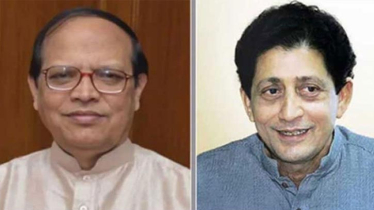
Photo : Messenger
In preparation for possible pre-election disturbances, law enforcement is proactively deploying CCTV cameras. This strategic endeavor includes the installation of surveillance cameras in the capital and crucial districts across the nation. Furthermore, a thorough inspection of existing CCTV installations is being conducted to verify their proper functioning and undertake any required maintenance.
Dhaka Metropolitan Police Joint Commissioner Biplab Kumar Sarkar informed The Daily Messenger that CCTV cameras are being deployed as part of preparations for potential conflicts. Additionally, efforts are underway to expand CCTV coverage to areas within the capital that currently lack such surveillance, ensuring a more comprehensive network of cameras.
As per a source within the Dhaka Metropolitan Police (DMP), they have initiated the process of installing CCTV cameras in approximately fifty areas of the capital. This action is based on the lessons learned from political violence that occurred in 2012. During that period, individuals involved in various acts of vandalism, such as petrol bomb attacks and car fires, could not be identified through the existing CCTV camera network. Hence, this expansion of surveillance aims to address such limitations and enhance security.
In this instance, the police have undertaken the initiative to install CCTV cameras in various locations for identification purposes. These areas include Kakrail Mor, Nayapaltan, Shantinagar, Malibagh Mor, Paltan Mor, Baitul Mokarram, Dainik Bangla Mor, Panthapath, Farmgate, Mirpur 10 Roundabout, Dhanmondi 27, Science Lab, Moghbazar Mor, High Court Turning Mor, Press Club, Jatrabari, Motijheel, Khilgaon, Shanirakhra, and Mohakhali.
Approximately 700 CCTV cameras have already been installed in the entire area, often referred to as the diplomatic zone, which includes Baridhara, Gulshan, and Niketan. Furthermore, around 80 percent of the capital, covering areas such as Uttara, Mirpur, and Dhanmondi, have been brought under CCTV surveillance. Additionally, some privately owned and police establishments have also implemented CCTV systems to enhance security and monitoring.
As per sources related to law enforcement, the police are actively expanding their surveillance coverage to encompass vital areas and facilities throughout the country in preparation for the forthcoming elections. They have significantly increased the deployment of CCTV systems. While certain key areas and establishments were already under police surveillance, this effort has extended to various divisional cities, important districts, highways, and even many tourist destinations. The motivation behind this expansion is the proven effectiveness of
CCTV in crime prevention and criminal identification. Consequently, the police are emphasizing and actively implementing the installation of CCTV as part of their strategy for maintaining security and law enforcement.
According to a police source, there are approximately 15,000 to 20,000 CCTV cameras used by the police for monitoring purposes across the country. In addition to these, there are hundreds of thousands of private CCTV systems, including those in residential areas and markets. The number of private CCTV systems is continually increasing. While the police monitor many significant areas using their own CCTV infrastructure, they also have access to public CCTV footage when necessary for law enforcement and security purposes.
It appears that various cities and districts in Bangladesh are making significant progress in installing CCTV cameras for surveillance and security purposes. For example, the Chittagong Metropolitan Police (CMP) has already installed 104 CCTV cameras in 16 police station areas, with about 200 more installations currently in progress. Similar efforts are underway in other cities like Rajshahi, Khulna, and Sylhet.
Moreover, cities such as Narayanganj, Gazipur, Savar, Ashulia, Tongi, Mymensingh, Tangail, Bogura, Sirajganj, Kushtia, Jashore, Khulna, Jhenaidah, Satkhira, Bagerhat, Barisal, Bhola, Cumilla, Feni, Noakhali, Chandpur, Laxmipur, Manikganj, Munshiganj, and nearly all other cities in the country have brought most of their district towns under CCTV surveillance. Additionally, many CCTV cameras are being installed along highways, and there are ongoing efforts to set up checkposts as directed by authorities. This widespread deployment of CCTV systems is intended to enhance security and law enforcement capabilities across the country.
In 2018, the Police Headquarters in Bangladesh proposed to enhance the entire police system by implementing closed-circuit TV (CCTV) cameras in police stations throughout the country. These proposals were submitted by the police headquarters to the Ministry of Home Affairs with the objectives of controlling crime, reducing public harassment, ensuring transparency and accountability within the police force, enhancing the quality of police services to the public, and leveraging advanced technology.
In line with this proposal, the ongoing efforts to install and repair CCTV cameras are part of a larger initiative to modernize and improve law enforcement capabilities in the country. These measures aim to create a more secure and accountable environment while utilizing advanced technology to meet the evolving needs of law enforcement and public safety.
DIG Ibrahim Fatemi from the police headquarters informed The Daily Messenger that the plan to extend surveillance to cover all significant areas and facilities across the country is in the process of being implemented. Many of these initiatives have already been put into action, and the installation of CCTV systems under both public and private initiatives continue to progress.
In response to a question, he emphasized the pivotal role played by CCTV in identifying and apprehending criminals. He pointed out that CCTV footage significantly aids in the quick and accurate identification of wrongdoers, making it a critical tool in law enforcement efforts.
DMP Joint Commissioner Biplab Kumar Sarkar stated, "We have made thorough preparations to prevent acts of sabotage. As a component of this preparedness, we utilize CCTV cameras to assist in the identification of criminals. To ensure the effectiveness of our surveillance, we assess the functionality of previously installed CCTV cameras and carry out repairs as needed. Furthermore, we are actively involved in the installation of new CCTV cameras in additional locations to enhance our security and monitoring capabilities.”
Messenger/Imran/Disha








